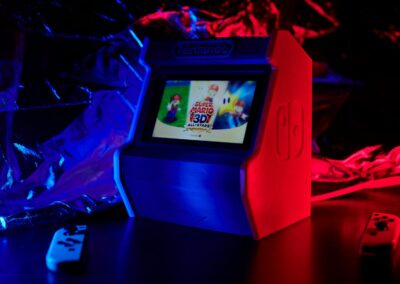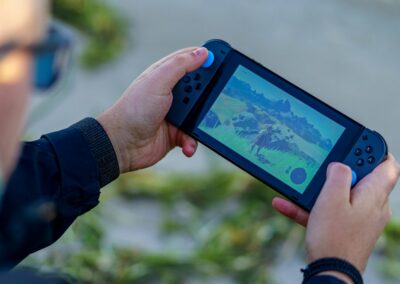Transforming Education through Interactive Games and Simulations
The Role of Educational Games in Modern Learning
Designing educational games and simulations to provide engaging and interactive content for students of all ages and grade levels has become a pivotal focus in contemporary education. In regions like Saudi Arabia and the UAE, where innovation in education is highly prioritized, integrating these technologies is helping to transform the traditional learning landscape. Educational games leverage the natural affinity children have for play to create an immersive learning environment that is both enjoyable and effective.
In Riyadh, schools are incorporating game-based learning to enhance student engagement and achievement. These games are not only designed to be fun but are also strategically developed to align with educational standards and curricula. By presenting academic challenges within a game context, students are more likely to remain motivated and invested in their learning. This method has proven particularly effective in improving outcomes in subjects like mathematics and science, where interactive problem-solving can significantly enhance understanding and retention.
Dubai’s educational institutions are also leading the charge in implementing educational simulations. These simulations provide a hands-on learning experience, allowing students to experiment with real-world scenarios in a controlled, risk-free environment. For instance, biology students can simulate complex biological processes, while history students can engage in virtual reenactments of historical events. This approach not only makes learning more dynamic but also encourages critical thinking and problem-solving skills, which are essential for academic and professional success.
Designing Effective Educational Games
The design of effective educational games involves a careful balance between entertainment and education. To create games that are both engaging and instructive, developers must consider various elements such as storytelling, gameplay mechanics, and feedback systems. A compelling storyline can captivate students’ interest and make the learning experience more relatable and memorable. Incorporating game mechanics like levels, rewards, and challenges can motivate students to persist through difficult tasks and achieve mastery.
In Saudi Arabia, educators and game developers are collaborating to create culturally relevant educational games that resonate with local students. These games incorporate elements of Saudi culture and history, making the content more relatable and engaging for students. By embedding educational content within familiar contexts, students can better connect with the material and apply their learning in real-world situations. This approach also helps in fostering a sense of national pride and cultural awareness among young learners.
Dubai’s focus on technological innovation extends to the development of sophisticated educational simulations. These simulations utilize advanced technologies such as artificial intelligence and virtual reality to create immersive learning experiences. For example, medical students can use VR simulations to practice surgical procedures, gaining valuable hands-on experience without the risks associated with real-life practice. This technology-driven approach not only enhances learning outcomes but also prepares students for the demands of modern professions.
Case Study: Implementing Educational Games in EFG Academy
EFG Academy, an esteemed educational institution, has successfully integrated educational games and simulations into its curriculum to enhance student engagement and achievement. By leveraging game-based learning, EFG Academy provides students with an interactive and enjoyable learning experience that promotes active participation and deep understanding.
At EFG Academy, educational games are used across various subjects to reinforce concepts and encourage critical thinking. For instance, in mathematics, students engage with games that require them to solve complex problems to advance to higher levels. This gamified approach makes learning mathematics more enjoyable and reduces the anxiety often associated with the subject. Similarly, in science classes, students use simulations to conduct virtual experiments, allowing them to explore scientific principles hands-on and visualize abstract concepts.
EFG Academy also uses simulations to provide students with real-world learning experiences. In social studies, students participate in simulations that mimic historical events or governmental processes, helping them understand the complexities of history and civics. By placing students in the shoes of historical figures or decision-makers, these simulations foster empathy and a deeper understanding of the material. The success of EFG Academy’s approach underscores the potential of educational games and simulations to revolutionize learning and improve student outcomes.
Game-Based Learning in Business and Professional Development
Leveraging Game Design in Executive Coaching
The principles of game design are not limited to K-12 education; they can also be applied to executive coaching and professional development. By incorporating elements of play and gamification, executive coaching programs can become more engaging and effective, helping business leaders develop essential skills in a dynamic and enjoyable manner.
In Saudi Arabia, companies are integrating game design principles into their executive coaching programs to drive engagement and development. These programs use simulation-based learning, where executives participate in virtual scenarios that mimic real-world challenges. By navigating these scenarios, leaders can develop critical thinking, problem-solving, and decision-making skills in a risk-free environment. This approach not only enhances the learning experience but also ensures that executives are better prepared to handle complex business situations.
Dubai’s corporate sector is also leveraging game design in professional development. Companies are using gamified training platforms that incorporate elements such as leaderboards, progress tracking, and rewards to motivate employees. These platforms provide a fun and interactive way for professionals to acquire new skills and knowledge, fostering a culture of continuous learning and improvement. By making professional development engaging and enjoyable, businesses in Dubai can ensure that their workforce remains motivated and equipped with the skills needed to drive organizational success.
Integrating Game-Based Learning into Leadership Development
Effective leadership and management skills are crucial for business success, and game design principles can play a significant role in developing these competencies. By incorporating gamification into leadership training, organizations can create immersive and interactive learning experiences that help leaders build essential skills in a practical and engaging manner.
In Riyadh, organizations are using game-based learning platforms to enhance leadership and management training. These platforms offer interactive modules that simulate real-life business scenarios, allowing leaders to practice and refine their skills in a controlled environment. Through role-playing exercises and decision-making challenges, leaders can develop a deeper understanding of effective management strategies and techniques. This hands-on approach not only enhances learning outcomes but also ensures that leaders are well-prepared to navigate the complexities of the modern business world.
Dubai’s focus on innovation extends to leadership development, with companies incorporating game design principles into their training programs. By using gamified learning platforms, organizations can create engaging and interactive training experiences that foster leadership skills. These platforms provide instant feedback, allowing leaders to track their progress and identify areas for improvement. By making leadership training more engaging and enjoyable, businesses in Dubai can cultivate a strong and capable leadership team that drives organizational success.
Conclusion: The Future of Game-Based Learning
Educational games and simulations have the potential to revolutionize education and professional development by creating engaging and effective learning experiences. In regions like Saudi Arabia and the UAE, where innovation and technological advancement are priorities, the integration of game-based learning is driving significant improvements in various sectors. By leveraging the power of gamification, educational institutions and businesses can create dynamic and adaptive learning environments that cater to individual needs and promote success.
The implementation of game-based learning requires strong leadership and effective project management. By investing in these areas, organizations can ensure that their gamified learning initiatives are successful and deliver the desired outcomes. As we move towards a future where game design principles are an integral part of education and professional development, embracing these innovations will be key to achieving educational excellence, business success, and sustainable growth in Saudi Arabia and the UAE.
—
#GameDesign, #EducationalGames, #Simulations, #StudentEngagement, #SaudiArabia, #UAE, #Riyadh, #Dubai, #ArtificialIntelligence, #Blockchain, #TheMetaverse, #ExecutiveCoaching, #GenerativeAI, #ModernTechnology, #BusinessSuccess, #LeadershipSkills, #ProjectManagement























